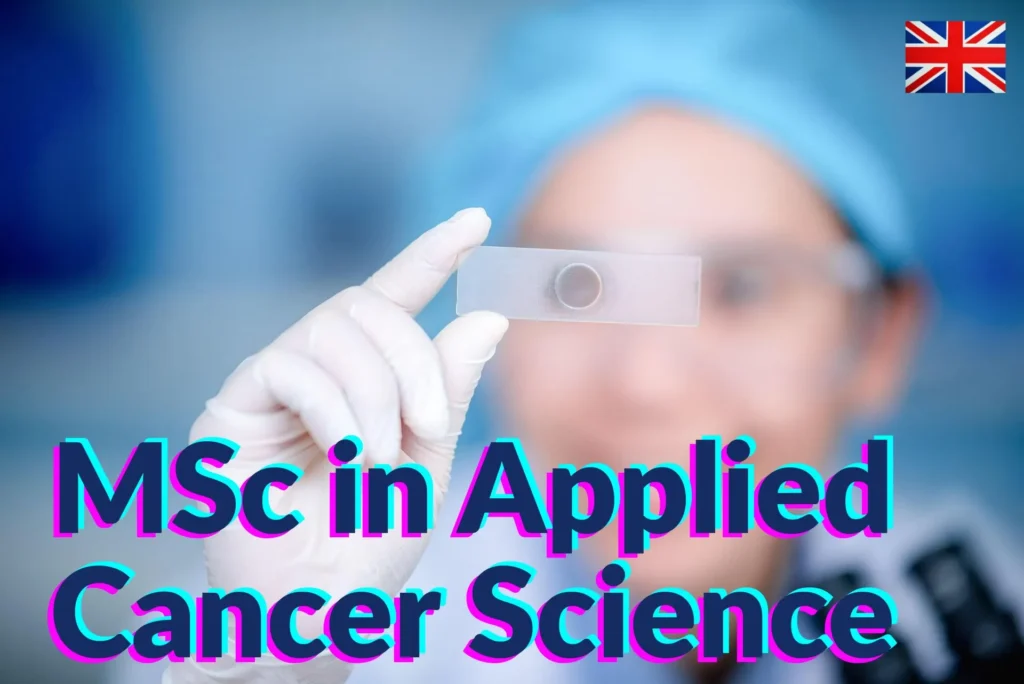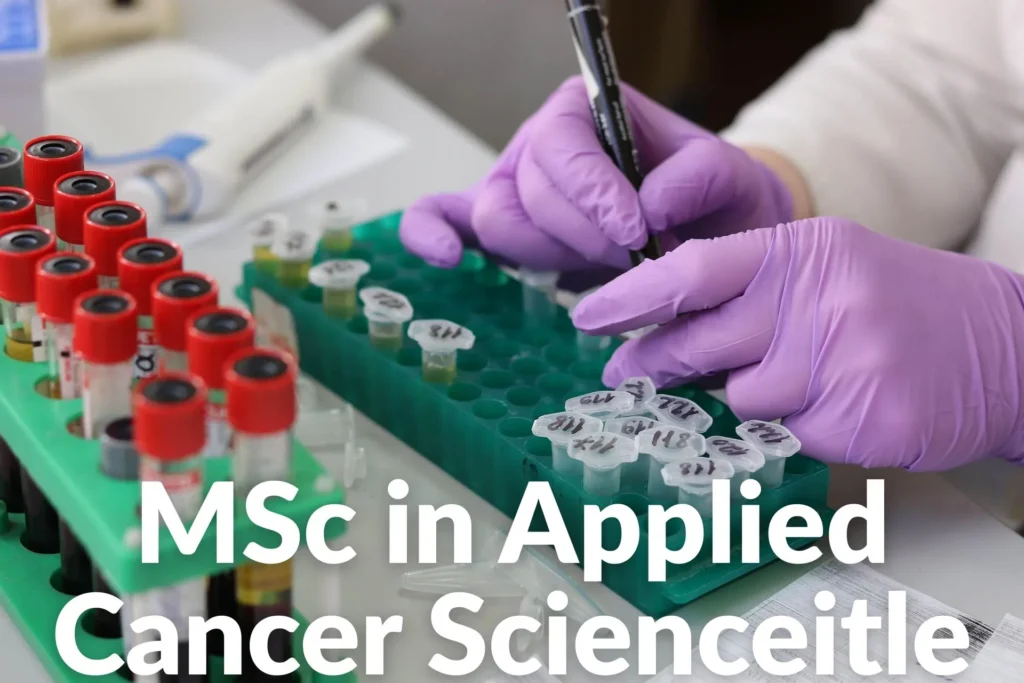MSc in Applied Cancer Science
The MSc in Applied Cancer Science at the University of Oxford is a prestigious, research-intensive one-year master’s program designed to shape the next generation of cancer scientists. Offered by the Department of Oncology, this program provides an in-depth foundation in the molecular and cellular mechanisms that drive cancer development, progression, and treatment response.
Oxford has earned global recognition as a leader in cancer research, combining cutting-edge laboratory innovation with real-world medical applications. Students are trained not only in theory but also in practical, translational skills that prepare them for impactful careers in cancer science, whether in academia, pharmaceuticals, or clinical research.
Oxford is world-leading research in oncology and biomedical sciences. Explore more Oxford courses on Whatsoxford.com
This course is ideal for students with a background in biomedical sciences, medicine, or related disciplines who aspire to become experts in cancer biology, oncology research, and precision medicine.
How to get in Oxford University 2026.

Course Highlights and Structure
The MSc in Applied Cancer Science is a one-year, full-time program, carefully structured to integrate advanced theoretical teaching with practical research experience.
Duration and Format
Full-time: 12 months (October to September)
Structure: Three terms – Michaelmas, Hilary, and Trinity
Core Focus Areas
The course is built around three core scientific pillars:
DNA Damage and Repair: Understanding the molecular mechanisms behind genetic instability and its role in cancer initiation.
Tumour Microenvironment: Examining how cancer cells interact with their surrounding tissues to promote tumor growth.
Immunology and Cancer Therapies: Exploring immune system regulation and emerging immunotherapy approaches.
Learning Approach
Students attend lectures, seminars, and tutorials led by Oxford’s oncology experts, complemented by hands-on laboratory sessions and independent research. This integrated approach ensures that graduates gain both scientific knowledge and essential research skills for career advancement.
Department and Research Environment
The MSc is delivered through the Department of Oncology, one of Oxford’s most dynamic academic divisions. The department is internationally recognized for its contributions to cancer biology, clinical oncology, and translational medicine.
Students benefit from:
- Access to state-of-the-art laboratories and research facilities.
Collaboration opportunities with major research centers such as the Oxford Cancer Centre, the Weatherall Institute of Molecular Medicine, and the Nuffield Department of Clinical Medicine.
Exposure to seminars, guest lectures, and interdisciplinary workshops featuring global leaders in oncology and biomedical innovation.
This environment provides students with an exceptional platform to engage with ongoing discoveries and contribute to Oxford’s mission to combat cancer at a global level.
Entry Requirements
To be eligible for the MSc in Applied Cancer Science, applicants must meet Oxford’s high academic and professional standards.
Academic Qualifications
-
A first-class or strong upper second-class undergraduate degree in a relevant subject such as biology, biochemistry, medicine, molecular genetics, or biomedical sciences.
-
Strong academic background in cellular biology, molecular genetics, and chemistry is advantageous.
English Language Requirements
For international applicants:
-
IELTS: Overall score of 7.5 (minimum 7.0 per component)
-
TOEFL iBT: Overall 110 (minimum 22 in listening, 24 in reading, 25 in speaking, and 24 in writing)
Professional Background
Although professional experience is not mandatory, applicants with prior laboratory or research exposure in biomedical sciences will have a competitive edge.
Oxford University Entry 2026 | Complete Application Guide
Application Process
Oxford’s application process is rigorous and transparent, ensuring that only the most qualified candidates are selected.
Step-by-Step Guide
Choose your course: MSc in Applied Cancer Science (Department of Oncology).
Prepare required documents:
Academic transcripts
Personal statement (explaining motivation and research interests)
Two or three academic references
Curriculum Vitae (CV)
Submit your application online through the Oxford University Graduate Application Portal.
Pay the application fee: Approximately £75 (subject to confirmation for 2025–26 entry).
Application deadline: December 2025 (check Oxford’s graduate admissions calendar).
Shortlisted candidates may be invited for an interview or additional document verification before final offers are issued.
Oxford University application for International students Full Details

Tuition Fees and Funding
Oxford maintains transparent and competitive fee structures for home and international students.
Tuition Fees (2025/26)
Home Students: £18,290
Overseas Students: £40,710
Funding Opportunities
Oxford offers several funding options for outstanding applicants:
Clarendon Fund Scholarships: Full funding for academically excellent international students.
Departmental Awards: Specific support from the Department of Oncology for research-focused candidates.
Reach Oxford Scholarships: Available for students from developing nations with exceptional merit and financial need.
College Scholarships: Offered through individual Oxford colleges.
Many scholarships are automatically considered at the time of application, so applicants are encouraged to submit their materials early.
Career Prospects and Outcomes
Graduates of the MSc in Applied Cancer Science are highly sought after in both academia and industry due to Oxford’s reputation for excellence in biomedical research.
Career Pathways Include:
PhD and Postdoctoral Research: Many graduates continue into doctoral programs at Oxford or other world-leading institutions.
Pharmaceutical and Biotechnology Roles: Research scientist, oncology specialist, or drug development positions.
Clinical and Translational Research: Positions in hospital or university-based cancer research programs.
Non-Profit and Global Health Organizations: Contributing to cancer research initiatives and public health policy.
Oxford alumni also benefit from lifelong access to the university’s career services, research networks, and global collaborations.
Why Study Applied Cancer Science at Oxford?
Oxford stands among the world’s foremost institutions for oncology and biomedical education. Its MSc in Applied Cancer Science combines scientific depth with clinical relevance, providing an unparalleled foundation for future leaders in cancer research.
Key Advantages
World-Class Faculty: Learn directly from leading researchers and clinicians.
Interdisciplinary Learning: Integration of biology, medicine, and advanced technology.
Global Research Collaborations: Partnerships with NHS, Cancer Research UK, and global institutions.
Cutting-Edge Facilities: Access to genomic sequencing labs, imaging platforms, and advanced bioinformatics resources.
Networking and Mentorship: Close interaction with faculty mentors and fellow researchers across disciplines.
Oxford’s environment cultivates innovation, leadership, and academic excellence, ensuring every graduate is prepared to make a meaningful impact in cancer science.
How to Apply / Next Steps
Interested candidates should begin preparing their applications well ahead of the December deadline to ensure all materials meet Oxford’s high standards.
Steps to Get Started
Visit the official Oxford University MSc in Applied Cancer Science course page.
Review entry criteria, documents, and application timelines.
Prepare a strong personal statement showcasing your motivation, academic achievements, and research interest in cancer science.
Contact the Department of Oncology for any specific inquiries or departmental funding options.
Submit your application online via the Oxford Graduate Admissions Portal.
Pro Tips for Applicants
Apply early to be considered for scholarship funding.
Highlight any prior lab or research experience.
Tailor your personal statement to show clear alignment with Oxford’s research objectives.
Conclusion
The MSc in Applied Cancer Science at the University of Oxford is more than a postgraduate degree — it’s a gateway to pioneering cancer research and innovation. With its advanced curriculum, world-class faculty, and access to leading research infrastructure, the program empowers students to become leaders in the fight against cancer.
Graduates emerge not only with academic excellence but also with the analytical, technical, and collaborative skills necessary to transform the future of oncology and biomedical science worldwide.
It’s a one-year, full-time master’s course by Oxford’s Department of Oncology that trains future researchers in DNA repair, tumour biology, and cancer immunology.
Applicants need a first-class or upper second-class degree in biomedical sciences, medicine, or related fields, plus English proficiency (IELTS 7.5 or TOEFL 110).
The course lasts one year full-time, running from October to September, with lectures, lab work, and a final research dissertation.
Graduates often continue to PhD or DPhil research or work in oncology, biotechnology, or pharmaceutical research, developing new cancer therapies.
For 2025/26, fees are about £18,290 for UK students and £40,710 for international students, with scholarships like Clarendon and Reach Oxford available.
